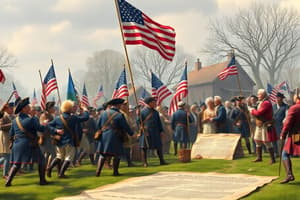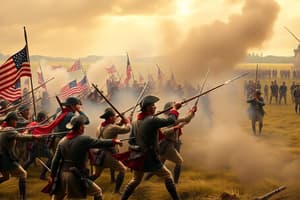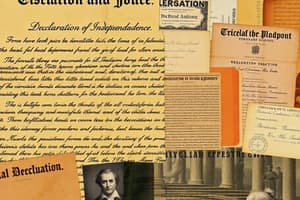Podcast
Questions and Answers
What does independence mean?
What does independence mean?
Freedom from being ruled by someone else.
What was a colonist called who wanted freedom from King George III?
What was a colonist called who wanted freedom from King George III?
A Patriot
What did Patrick Henry, a patriot, say in a speech?
What did Patrick Henry, a patriot, say in a speech?
Give me liberty or give me death!
What was Thomas Paine's pamphlet called and what did it say?
What was Thomas Paine's pamphlet called and what did it say?
Who was Richard Henry Lee?
Who was Richard Henry Lee?
What is a declaration?
What is a declaration?
What did Thomas Jefferson write about in the Declaration of Independence?
What did Thomas Jefferson write about in the Declaration of Independence?
What are rights?
What are rights?
How did King George not protect the colonists' rights?
How did King George not protect the colonists' rights?
Were these ideas about governments serving the people new?
Were these ideas about governments serving the people new?
What is the main idea of the Declaration of Independence?
What is the main idea of the Declaration of Independence?
What happened on July 4, 1776?
What happened on July 4, 1776?
What is treason?
What is treason?
Why was signing the declaration dangerous?
Why was signing the declaration dangerous?
What was different in 1776 in the words 'all men are created equal' from today?
What was different in 1776 in the words 'all men are created equal' from today?
Who was a woman who fought for equal rights?
Who was a woman who fought for equal rights?
Answer yes or no to the two questions below. 1.) Does the declaration state that everyone has certain rights? 2.) Can a government take away those rights?
Answer yes or no to the two questions below. 1.) Does the declaration state that everyone has certain rights? 2.) Can a government take away those rights?
Flashcards are hidden until you start studying
Study Notes
Independence and Patriots
- Independence refers to freedom from external rule or control.
- Colonists desiring freedom from King George III were known as Patriots.
Notable Speeches and Pamphlets
- Patrick Henry famously declared, "Give me liberty or give me death!"
- Thomas Paine's pamphlet, Common Sense, argued that King George treated the colonies unfairly and advocated for independence.
Key Figures and their Actions
- Richard Henry Lee, a Virginia delegate, proposed the official declaration of independence to Congress on June 7, 1776.
Declaration of Independence
- A declaration is a formal statement announcing a particular idea or principle.
- Congress needed a document to formally announce the colonies' independence from British rule.
Jefferson's Contributions
- Thomas Jefferson highlighted in the Declaration that all people are born with rights, including the right to freedom and life.
- The Declaration asserts that a government must protect these rights, and if it fails, the people are entitled to establish a new government.
Understanding Rights
- Rights are freedoms guaranteed and protected under government law.
- King George violated the colonists' rights by imposing taxes and deploying soldiers to control them.
Historical Context
- The principles of government accountability and rights protection were not novel; thinkers like John Locke had advocated similar ideas.
- The Declaration of Independence outlines fundamental concepts of freedom and equality.
Signing the Declaration
- On July 4, 1776, the Second Continental Congress voted to adopt the Declaration.
- Signing the Declaration was perilous; delegates risked being termed traitors by Britain, with potential for execution.
Societal Implications
- The phrase "all men are created equal" in 1776 did not imply equal rights for all, as only white male property owners were allowed to vote.
- Abigail Adams, wife of John Adams, was a notable advocate for equal rights.
Rights Affirmation
- The Declaration asserts that everyone possesses certain rights and that a government cannot infringe upon them.
Common Sense Influence
- Common Sense played a significant role in shifting public opinion towards independence.
Comparing Common Sense and the Declaration
- Both works advocated for freedom and independence but differed in their approach and audience.
Studying That Suits You
Use AI to generate personalized quizzes and flashcards to suit your learning preferences.




